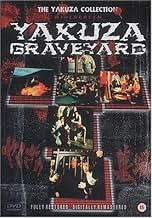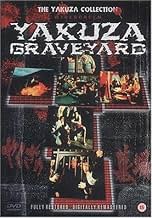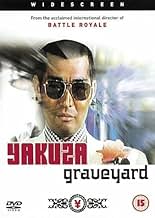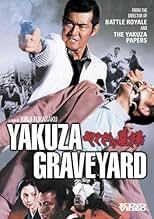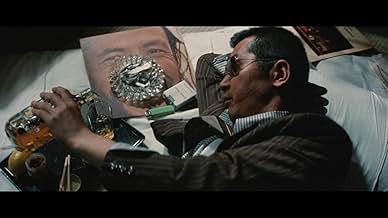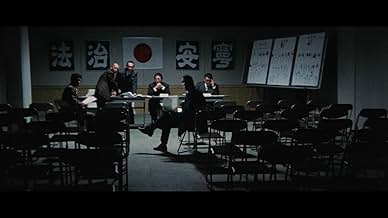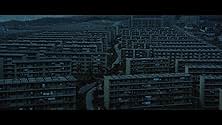IMDb-BEWERTUNG
7,0/10
1148
IHRE BEWERTUNG
Füge eine Handlung in deiner Sprache hinzuA forceful new police precinct officer clashes with the local yakuza, contrasting his methods with his colleagues and becoming entangled with a woman connected to the criminal underworld.A forceful new police precinct officer clashes with the local yakuza, contrasting his methods with his colleagues and becoming entangled with a woman connected to the criminal underworld.A forceful new police precinct officer clashes with the local yakuza, contrasting his methods with his colleagues and becoming entangled with a woman connected to the criminal underworld.
- Auszeichnungen
- 2 wins total
Masataka Naruse
- Machinaga
- (as Tadashi Naruse)
Empfohlene Bewertungen
This is a good movie. It's directed by Kinji Fukasaku who's a top director. There's lashings of style and substance to the film with a pace that never lets up throughout the film. It's like a gritty Pulp Fiction, but with the characters more low-key and more attention paid to the story line. Anyway, a good score, great acting and plenty of fights makes this a must see for anyone keen on the Yakuza or stories like The Limey. The story centers around an undercover cop, who is reassigned to a new precinct and sets out to put the mobsters behind bars. Along the way he gets involved with the people he is trying to put away, finding them to be the victims of fate rather than the villains they appear to be. This part of the story is offset around a larger picture of police corruption with the Yakuza pulling their strings. A cinematic masterpiece by a fascinating director.
Watched this fairly late on a Friday night, so I'll keep this review brief, because bed is calling out to me.
I've been really into yakuza films lately, as I like crime films and I really dig Japanese cinema, and the yakuza sub-genre quite naturally combines the two. The thing I liked most about this particular one was its unique take on the "undercover cop infiltrating a criminal gang" premise.
In it, the central protagonist (the undercover cop) gets friendly with a gang, and they know pretty quickly where he's from. So the conflict isn't about whether or not he'll get found out; it's more about finding out on which side of the law his intentions truly lie (if he has any strong feelings one way or the other), and later, conflict arises when the police get angry at him for seeming to enjoy his interactions with the yakuza too much.
It's got a great premise and a strong opening half-hour. It's also really well-filmed throughout, with some great, frantic camerawork, and all the performances are solid. But it did get a bit too messy for my liking, with a plot that could have gone in numerous interesting directions, but didn't really seem to commit to one solidly enough. Maybe this was intended to mirror the feelings of the main character... or it could've been that the writing of the screenplay was just a bit rushed. I guess I'll never know for sure...
I've been really into yakuza films lately, as I like crime films and I really dig Japanese cinema, and the yakuza sub-genre quite naturally combines the two. The thing I liked most about this particular one was its unique take on the "undercover cop infiltrating a criminal gang" premise.
In it, the central protagonist (the undercover cop) gets friendly with a gang, and they know pretty quickly where he's from. So the conflict isn't about whether or not he'll get found out; it's more about finding out on which side of the law his intentions truly lie (if he has any strong feelings one way or the other), and later, conflict arises when the police get angry at him for seeming to enjoy his interactions with the yakuza too much.
It's got a great premise and a strong opening half-hour. It's also really well-filmed throughout, with some great, frantic camerawork, and all the performances are solid. But it did get a bit too messy for my liking, with a plot that could have gone in numerous interesting directions, but didn't really seem to commit to one solidly enough. Maybe this was intended to mirror the feelings of the main character... or it could've been that the writing of the screenplay was just a bit rushed. I guess I'll never know for sure...
Very good and not over long, this is a splendid violent Yakusa action film, although not bloody. There is rather much shouting and screaming but the camerawork is wonderful with many tricks, freezes and hand held work. I seem not to have seen much of the director Kinji Fukasaku expect of course of Battle Royale (2000). I loved seeing Meiko Kaji here and with before so much more like Lady Snowblood (1973) and the fantastic, Female Prisoner:701 Scorpion (1972). Cinematic all the way, a little confusing now and again but it is great with that stunning camera always going on and magnificent as thrilling all the time.
There's not much to say really about YAKUZA GRAVEYARD perhaps other than it is a Kinji Fukasaku movie that finds the unsung master of the crime genre firing on all cylinders, his cinematic craft honed to stultifying perfection. Narrative use of montages and stills, hyperkinetic camera-work, relentless action, groovy score, convoluted plot, all the stylistic hallmarks of his yakuza directorial output are present and I'm sure he knew them so well by this point I bet he could knock one out of the park with his eyes closed. All in all an orgasmic smorgasbord of no-nonsense seventies crime cinema that takes no prisoners and that will have every last one of the genre's enthusiasts raising fists in the air with excitement. If you've perused any of Fukasaku's back catalogue from the early seventies you know exactly what I'm talking about YG is not particularly original in that aspect but it shows the great Japanese director doing what he does best and doing it better than everybody else, then and now.
The cast is spearheaded by the always enjoyable and charismatic Tetsuya Watari (worked with Fukasaku in GRAVEYARD OF HONOUR - which Takashi Miike remade in 2002) and the fragile but determined Meiko Kaji, and is also populated by lots of familiar faces like Nagashi Oshima. Watari starts out as abusive cop strongarming yakuza thugs for information and the movie seems to be heading to a general cops vs thugs direction, that is until Fukasaku pulls an inverted Dirty Harry and has Watari siding with one of two yakuza gangs duking it out in the Tokyo underworld, pledging blood oaths with one of the underbosses and becoming romantically entangled with the wife of the boss who's away, doing time in prison. Kaji is said wife, a Korean half-breed and ex-hooker, running the gang in her husband's stead, emotionally vulnerable and leading an unfulfilled life. In the end Watari arrives to the same conclusions regarding the police as Clint Eastwood did in Dirty Harry, only the police he's renouncing is in bed with the yakuzas, doing political deals under the table, and his way of renouncing it is a lot harder and more violent than symbolically tossing a badge in a lake a suitable, excellent ending to a grim and gritty piece. His transition from one end to the other is a bit abrupt but what the heck, this is a genre piece and not a character study so I'm not picky.
What easily stands out about YG is its breakneck, furious pace. The viewer will be forgiven for scratching his head in several occasions, wondering how the movie got where it is, and the convoluted plot doesn't really help orientation. It's basically plot-plot-plot only with torrents of mean asskicking, relentless and blistering as only Fukasaku knows how to shoot it. Every five minutes someone's getting his ass kicked it's as simple as that and no exaggeration. It makes Steven Seagal flicks look like romantic comedies. Overall a top notch crime action flick that hasn't dated one bit in the places that matter and a definitive must-see for Fukasaku and yakuza fans.
The cast is spearheaded by the always enjoyable and charismatic Tetsuya Watari (worked with Fukasaku in GRAVEYARD OF HONOUR - which Takashi Miike remade in 2002) and the fragile but determined Meiko Kaji, and is also populated by lots of familiar faces like Nagashi Oshima. Watari starts out as abusive cop strongarming yakuza thugs for information and the movie seems to be heading to a general cops vs thugs direction, that is until Fukasaku pulls an inverted Dirty Harry and has Watari siding with one of two yakuza gangs duking it out in the Tokyo underworld, pledging blood oaths with one of the underbosses and becoming romantically entangled with the wife of the boss who's away, doing time in prison. Kaji is said wife, a Korean half-breed and ex-hooker, running the gang in her husband's stead, emotionally vulnerable and leading an unfulfilled life. In the end Watari arrives to the same conclusions regarding the police as Clint Eastwood did in Dirty Harry, only the police he's renouncing is in bed with the yakuzas, doing political deals under the table, and his way of renouncing it is a lot harder and more violent than symbolically tossing a badge in a lake a suitable, excellent ending to a grim and gritty piece. His transition from one end to the other is a bit abrupt but what the heck, this is a genre piece and not a character study so I'm not picky.
What easily stands out about YG is its breakneck, furious pace. The viewer will be forgiven for scratching his head in several occasions, wondering how the movie got where it is, and the convoluted plot doesn't really help orientation. It's basically plot-plot-plot only with torrents of mean asskicking, relentless and blistering as only Fukasaku knows how to shoot it. Every five minutes someone's getting his ass kicked it's as simple as that and no exaggeration. It makes Steven Seagal flicks look like romantic comedies. Overall a top notch crime action flick that hasn't dated one bit in the places that matter and a definitive must-see for Fukasaku and yakuza fans.
Fukasaku's film, also known as "Yakuza Graveyard," is a compelling Japanese crime drama, from the director of "Battle Royale."
The plot centres on a 'cop on the edge,' played by Tetsuya Watari, a character far more disturbed than, say, Dirty Harry or Popeye Doyle from "The French Connection." Indeed, Watari's rebelliousness seems far more shocking in the context of Japanese society, where respect for authority and conformity are supposedly ingrained.
Equally interesting is the portrayal of the Yakuza. It is a crime family in the mould of "The Godfather," but more prosaic and less self-important than the clan created by Francis Ford Coppola. Above all, the film's theme is the lack of honour in Japanese society. The police are corrupt, and in many respects indistinguishable from the Yakuza. The central character develops a close relationship with one of the mobsters, whom he discovers is far more honourable and trustworthy than his police colleagues.
All in all, a fascinating and fast-paced movie.
The plot centres on a 'cop on the edge,' played by Tetsuya Watari, a character far more disturbed than, say, Dirty Harry or Popeye Doyle from "The French Connection." Indeed, Watari's rebelliousness seems far more shocking in the context of Japanese society, where respect for authority and conformity are supposedly ingrained.
Equally interesting is the portrayal of the Yakuza. It is a crime family in the mould of "The Godfather," but more prosaic and less self-important than the clan created by Francis Ford Coppola. Above all, the film's theme is the lack of honour in Japanese society. The police are corrupt, and in many respects indistinguishable from the Yakuza. The central character develops a close relationship with one of the mobsters, whom he discovers is far more honourable and trustworthy than his police colleagues.
All in all, a fascinating and fast-paced movie.
Wusstest du schon
- VerbindungenReferences Verdammt in alle Ewigkeit (1953)
Top-Auswahl
Melde dich zum Bewerten an und greife auf die Watchlist für personalisierte Empfehlungen zu.
- How long is Yakuza Graveyard?Powered by Alexa
Details
Zu dieser Seite beitragen
Bearbeitung vorschlagen oder fehlenden Inhalt hinzufügen

